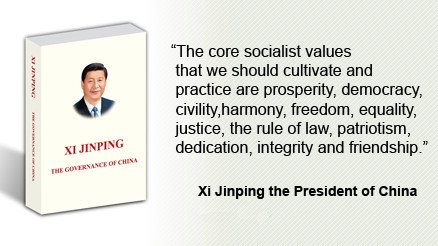Xi Jinping on governance and the socialist market
- By Heiko Khoo
 0 Comment(s)
0 Comment(s) Print
Print E-mail China.org.cn, November 18, 2014
E-mail China.org.cn, November 18, 2014
"The Governance of China" is a compilation of Xi Jinping's speeches and writings on this question. It provides in-depth insight into the thoughts of China's leadership and the problems and solutions that the Party grapples with today. It is essential reading for those who want to grasp the intellectual framework within which China's system actually operates.
This article looks at one speech from the book, titled "Align Our Thinking with the Guidelines of the Third Plenary Sessions of the 18th CPC Central Committee." In this speech, Xi identifies China's governance capacity as a system of institutions led by the Party that address economic, political, cultural, social and ecological issues in addition to building laws, regulations and the Party structure. Governance capacity is defined as a government's overall ability to effectively administer society and the state. Xi explains that Karl Marx and Friedrich Engels only made predictive statements on socialist governance, while Vladimir Lenin, the founder of the Soviet Union, was primarily concerned with urgent questions of defense and reconstruction and died too soon to leave any legacy on the question of peacetime governance. The system established in the Soviet Union under Stalin and his successors provided some experience, but the system's flaws eventually led to the USSR's collapse.
Xi says that China has been able to refine its methods of administrative power based on strong economic growth, but the quality of governance must be defined by its capacity to meet popular expectations in an environment in which global affairs also influence and shape opinions and attitudes. Therefore, the level of personal and institutional success in China is decided by the extent to which the advantages of socialism are realized. To ensure that Party governance is democratic and effective, legal and administrative forms and procedures need to be modernized and standardized, making them transparent and rule-based.
Echoing Deng Xiaoping, Xi explains that revolution and reform were both designed to "emancipate the productive forces" and "establish a vigorous socialist economic structure" in order to unleash the potential of society and technology "to open an abundance of social wealth." In Xi's opinion, China is at the "primary stage of socialism." It is the world's largest developing country with "backward social production" and rising material and cultural needs among the masses. This contradiction compels the Party to focus primarily on economic work.







Go to Forum >>0 Comment(s)